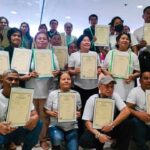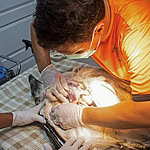NOTE: THIS PRESS RELEASE WAS FIRST PUBLISHED IN THE BOHOL CHRONICLE’S SUNDAY PRINT EDITION.
The Provincial Government of Bohol (PGBh) turned over two more water desalination facilities for island barangays in Talibon and Bien Unido.
These were implemented through the Philippine Rural Development Project (PRDP) of the Department of Agriculture, funded by the World Bank and with the counterpart of the PGBh.
On Friday’s The Capitol Reports, Engr. Ronilita Bunado, PRDP coordinator, reported that four priority projects have been completed under the grant.
A P12.7 million facility was inaugurated in Barangay Guindacpan in Talibon while a P13M system was opened in Barangay Bilangbilangan Dako in Bien Unido on July 8.
These were in addition to already turned-over potable water systems in Barangay Cataban in Talibon and Barangay Hingotanan in Bien Unido.
“Nakita nato ang kahinangop sa mga tao sa tubig,” Provincial Engineer Camilo Gasatan said.
He shared the joy and relief felt by island barangay residents who for a long time, relied on rain collectors for water used for drinking and other domestic purposes.
He also pointed out that beneficiaries will no longer spend extra for potable water from the mainland.
The desalination project separates minerals through reverse osmosis technology from seawater, making the water safe for human consumption.
Under the setup, the barangay is tasked to manage the project, forming a barangay water supply association that will handle the maintenance of the system.
An operation and maintenance plan along with a Memorandum of Agreement between the municipality concerned and the barangay is also undertaken about the operation and maintenance of the facility.
Moreover, filters and tools have also been provided for the maintenance of the facility.
According to Gasatan, barangays are encouraged to regulate the usage of the facility through the collection of minimal fees for use in its maintenance.
Bunado said the set tariff rate is suggested at P20 per 20L gallon of water.
Aside from the lack of water, the project is also seen to address health and safety with regular monitoring of water quality by local health units.
Meanwhile, the 60% wastewater/saline water byproduct of the water station will go to a cistern tank which can be utilized by barangay recipients for other domestic water uses. There are processes employed at present in the manufacture of salt through evaporation.
The province, with its excellent performance in the implementation of PRDP, has received the highest investment in the program across the country.
It also earned an unqualified opinion from the Commission on Audit in the proper utilization of funds and implementation of components for the project.
The PGBh, in its strategic governance roadmap under the leadership of Gov. Erico Aristotle Aumentado and Vice Governor Dionisio Victor Balite, has underscored the importance of access to potable water not only through PRDP but also through priority projects under the 20% development fund for implementation in 2024 and 2025.
It also has in the pipeline a P4.6 billion bulk water supply project, which feasibility study is ongoing.
Also present during the weekly broadcast were Forester Joemar Cuerbo and Aquaculturist II Pacifico Alfarero of the Bohol Provincial Environment Management Office along with Engr. Deo Rickie Dalida and Engr. Angelus Sales of the Provincial Planning Development Office. (PIMO/RJG/LMS)



